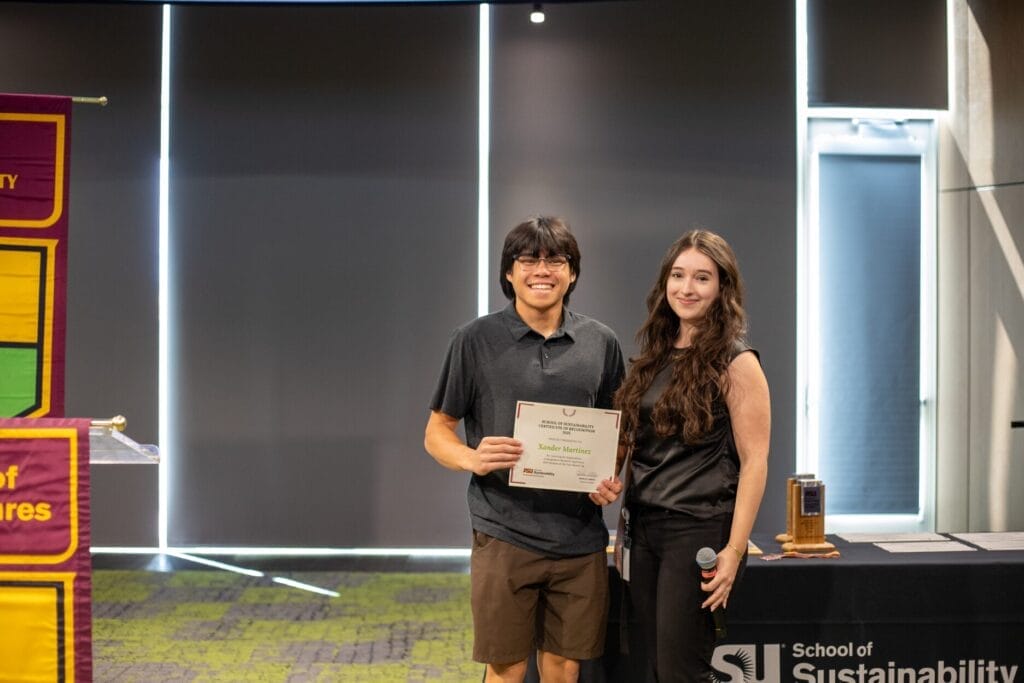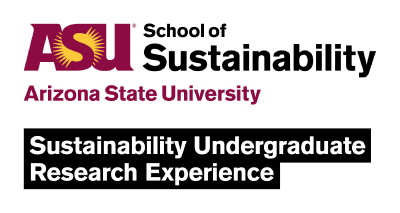
SURE Program
The Sustainability Undergraduate Research Experience Program at Arizona State University
ASU’s Sustainability Undergraduate Research Experience (SURE) program provides students with research opportunities to help build career skills and enhance competitiveness for jobs and graduate school. Through the program, students will enhance their knowledge, skills, and experiences in exploration and discovery to generate knowledge and develop evidence-based solutions for sustainability.
The research positions in the SURE program cover a wide variety of sustainability challenges, such as:
• sustainable governance and collective action
• urban and environmental planning
• food, water, and energy systems management
• human health and wellbeing
• environmental justice and just transitions
• ecosystem dynamics and management
Projects address societal and biological dynamics, as well as the innovations and solutions that address complex sustainability problems. Diverse faculty will be involved as supervisors, including natural scientists, engineers, social scientists and scholars in the humanities.
Preparation and instruction
Both on-campus and online undergraduate students are eligible for this program. In fall term, SURE projects are advertised in A session and students apply in mid-October. Students are then chosen for projects in B session, and the research is conducted in the C-session of spring term. Many SURE students enroll in 3-credits of independent research in spring C-session, but this is not required.
To learn more and enhance your chances of being selected for a project, enroll in SOS 246: Exploring Sustainability Research, during the A session of fall term.
The one-credit course is primarily composed of faculty guest presentations, and the assignments are designed to support your application to projects.
ASU faculty and Ph.D. students interested in supervising SURE students can email program director, Datu Agusdinata, at [email protected]. Students with questions regarding the SURE program can reach out to the program coordinator, Paulina Johnson, at [email protected].
Timeline: Program overview
July – early August: A call for projects is sent to faculty and Ph.D. students to gather SURE opportunities for the academic year.
August – September: Students learn about project opportunities for spring term; students in SOS 246 view videos and descriptions for SURE projects offered by participating faculty and their research teams.
Late September – early October: The application form (forthcoming in September) opens in the fall with applications due mid-October. The form asks for student resumes and other information to help with placement in SURE projects. Watch for announcements in late September with applications due in mid-October.
Note: We have created a guide to submitting a strong application that you can view and download. While only a resume is required to apply for projects, we have seen more success for students who submit cover letters too.
November: Project supervisors review application materials. Some supervisors will interview students and will contact students directly to schedule them. Once supervisors select students, both the student and faculty should confirm their selections with each other and the SURE coordinator.
Note: Students who applied to multiple projects may hear back from multiple supervisors. These students need to clearly communicate to all who reached out and the SURE coordinator which project(s) they will join in the spring.
November – December: Students potentially enroll in course credit with their supervisors for spring term.
Highlights from past years
Here’s what past SURE participants had to say about the program and Exploring Sustainability Research course:
The class taught me a lot more about grad school and applications [for varied] purposes. All of my immediate family members dropped out of college besides my grandparents, so I don’t really have anyone to help answer these questions or help me through it.
The most surprising thing I learned was how approachable and flexible most of the researchers are which turned the thought of research from one of stress to one of excitement. At the beginning of the semester, I was worried that the research faculty would be very intimidating but I found instead a very welcoming community.
Something I learned about sustainability research is that it’s accessible to undergraduate students. I’m not sure why, but even before I started pursuing higher education at community college, I assumed research was something only graduate students, or students who were well-connected, could participate in.
Student of the Year Awards
Student of the Year: Jasmine Catano Mata

Runners-up: Rozetta Locksa and Xander Martinez

Outstanding Poster Award
Outstanding Poster Award: Roy Reyes (supervised by Jose-Benito Rosales Chavez)
Runners-up: Emily Pearce (supervised by Raksha Balakrishna) and Nevaeh Cazares (supervised by Kaitlyn Malakoff)
